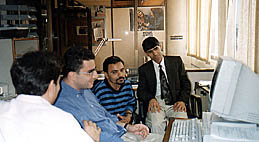
Abdulaziz Omar “A valuable camera doesn’t make a good photographer.” [Archives:1998/31/Sports]
August 3 1998

Omar took part in many international courses and exhibitions. Lately, he was chosen to participate in the training course at the Agence France Press regional center. This was a chance for the Yemeni press to cover the World Cup ’98 activities in France. Yemen Times had this friendly talk with Omar about sport photography and about his experience in that field:
Q: How did you start sport photography?
A: I was very interested in photography and in knowing the latest about world photographers. I used to collect all the beautiful and expressive photographs published in news papers. When I finished my military service in 1981, I joined the Aden News Agency as a trainee. There, I learned much about the principles and fundamentals of photography.
I had a 3-month photography course at the hands of Mr. Ali Raweh who helped me a lot. After that, I joined a short course at the Information Institute in Aden. That course was supervised by a German professional. Later, I began to cover several matches and sport activities. After the country’s unification, I was appointed the head of photo-journalism at the Saba News Agency.

A: Yes, for example, during a football match between Al-Wahda and Al-Tilal in Aden before unification, I was able to take a photo of Sami Na’ash of Al-Tilal touching the ball. This foul made Khalid Afarah of Al-Wahda score the winning goal out of a penalty kick. I also took valuable photos of the violence that followed the match between the Wahda of Sanaa and the Wahda of Aden in 1997.
Q: Can any photographer become a sports photographer?
A: Not everybody has a camera is a photographer. Added to experience and being familiar with sports rules, a photographer must be a sensitive person who loves his profession, a person of good temper who always smiles. He must never imitate others or let himself to self-conceit. A valuable camera does not make a successful photographer.
Q: Did it ever happen that your camera stopped working while you were covering a match?
A: Never. I always check my camera before using it. I take with me all the necessary things I might need while photographing.
Q: Are you influenced by local, Arab or foreign photographers?
A: I like the photographs of the late Ahmed Ibrahim Suleili, Ali Raweh, Mohammed Aqabat and Naji Musleh. As for the Arab photographers, I’m influenced by Farooq Ibrahim, who is called ” the leaders’ photographer”, Fares Hammad, the Tunisian photographer Bashir Al-Noubi – the distinguished photographer during the World Cup ’98. Also, I admire the work of some foreign photographers such as the English David Sabrodnis, the German photographer Rodgir Fisal and the Dutch photographer Hanz Hues.
Q: What exhibitions have you participated in, and how have you benefited from them?
A: I have participated in various foreign and Arab exhibitions. My first participation was in the exhibition held by the Iraqi Photography Society in Baghdad. Then I participated in the ” Best International Sports Photo” competition. Also, I participated in the “Best Photo of the Year” competition in Holland in addition to my participation to celebrate the 50th anniversary of the U.N in New York. Finally, I participated in the “Best International Sports Photo” competition in Jordan. I benefited a lot. What I have seen in these exhibitions along with the modern techniques gained me new knowledge in dealing with the camera.
Q: Can you evaluate the sports situation in Yemen?
A: Yemeni sportsmen and women have big ambitions. But they are hindered by mis-management and lack of resources, which make the sports situation unstable.
Moreover, the Ministry of Youth and Sports has not conducted any survey this year on the sports accomplishments of Yemeni athletes in various games. This is very important to ascertain the need for training courses, taking into consideration that the Youth
——
[archive-e:31-v:1998-y:1998-d:1998-08-03-p:./1998/iss31/sports.htm]


